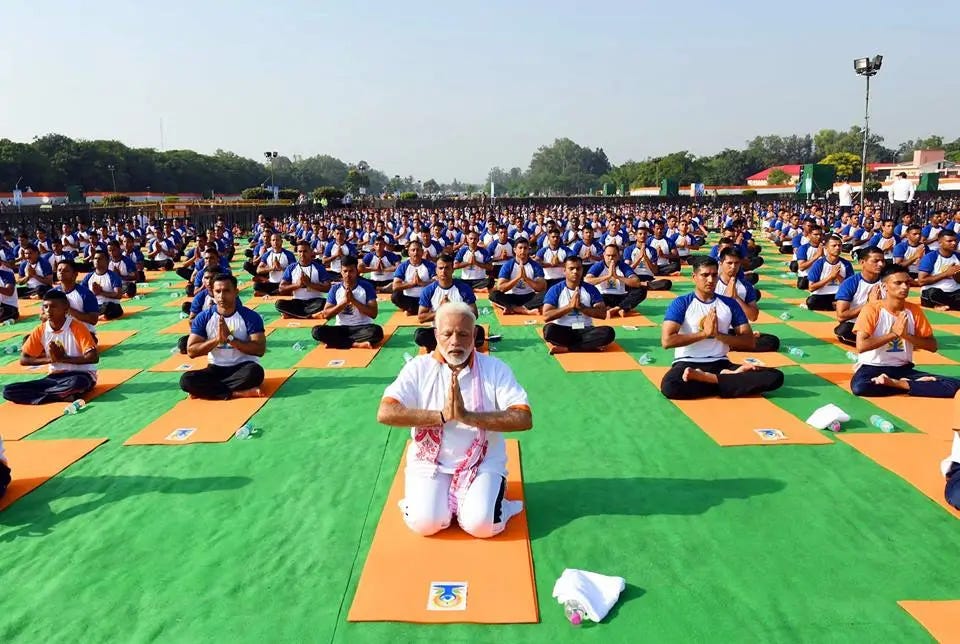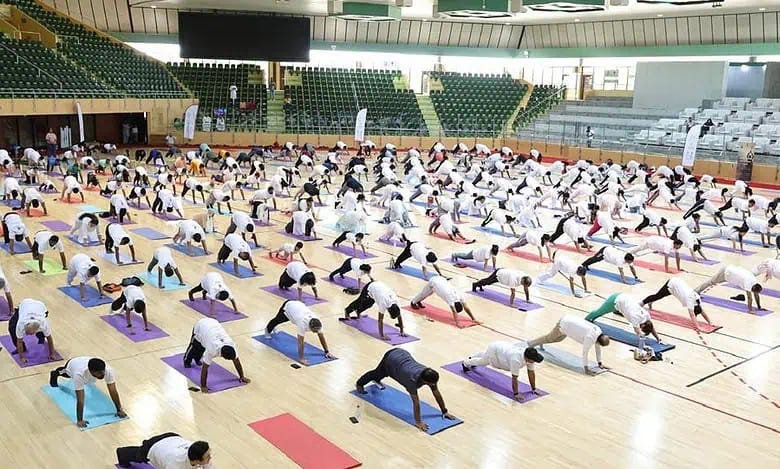The Politics of Yoga
Yoga's global influence has become a powerful tool for India's soft power. But how is the Hindu nationalist government leveraging this cultural export?

Welcome to Sports Politika, a media venture founded by investigative journalist and researcher Karim Zidan that strives to help you understand how sports and politics shape the world around us. Our mission is to offer an independent platform for accessible journalism that raises awareness and empowers understanding.
If you share this vision, please consider supporting us by joining our community and becoming a paid subscriber.
Standing amid a sea of headscarf-wearing students during the 10th International Day of Yoga event in Kashmir—India’s Muslim-majority region— on June 21, Prime Minister Narendra Modi spoke of yoga as a “power for global good.”
“Yoga’s utility is being recognized globally,” Modi said. “There is barely any world leader who has not discussed yoga during his interactions. Yoga has become a part of daily life in every corner of the world”
Modi noted that Muslims around the world were adopting yoga, citing examples such as the addition of yoga therapy in Turkmenistan medical universities, the inclusion in Saudi Arabia’s education system and the development of yoga-specific schools in Mongolia. He even made reference to yoga photography being used to promote tourism in Egypt.
Modi’s speech also attempted to position yoga—a practise first derived from Hinduism—as a non-religious form of exercise and meditation for Indian Muslims, emphasizing that those who practice yoga could use any incantations “whether it’s Allah, Ishwar or Waheguru”.
This has been met with both skepticism and criticism by some Muslims in India who believe the Modi is using yoga and events such as the International Day of Yoga to impose Hinduism on religious minorities under the guise of yoga.
Since India’s independence, Muslims have often faced discrimination, prejudice, and violence, despite constitutional protections. Muslims make up approximately 14% of India’s 1.6 billion (majority Hindu) population, which is one of the largest Muslim populations in the world.
Under the leadership of Prime Minister Narendra Modi and the ruling Bharatiya Janata Party (BJP), which has pursued a Hindu nationalist agenda since elected to power in 2014, anti-Muslim sentiments have heightened while their rights and freedoms have gradually been chipped away.
Over the past few months alone, Modi has called Muslims “infiltrators” and said they “have too many children,” referring to a Hindu nationalist trope that Muslims produce more children with the aim of outnumbering Hindus in India. He has also accused the rival Indian National Congress party of scheming to “loot” wealth from the country’s Hindus and redistribute it among Muslims.
Modi’s incendiary statements against Muslims led to an increase in violence against the religious minority, which sparked protests in India and resulted in international condemnation.
Beyond his escalating rhetoric, Modi also appears to be incorporating yoga as a means to influence India’s Muslim-minority.
During an interview with Times Now—an English-language news channel in India noted for its favourable reporting on the ruling BJP—Modi accused Indian Muslims of “spoiling the future of your children.” He also claimed that Indian Muslims are not “changing” like other Muslim communities, citing yoga’s incorporation in other Muslim-majority countries.
“When I go to Gulf countries, I get respect as an individual and also as the PM of India. Yoga is a part of the official academic curriculum of Saudi Arabia. If I talk about yoga in India, then, you call it ‘anti-Muslim'” he pointed out.
“When I meet the affluent people in Gulf nations, they always ask me about Yoga during lunch or dinner. Sometimes they ask what official training programmes can be done for a particular form of Yoga. Some tell me that their wives go to India to learn yoga and stay there for a month. Here, I am talking about the wives and family members of Emir (ruler),” PM Modi continued.
“Here in India, the concept of Yoga has been reduced to a Hindu-Muslim debate. I request those Muslims who are doing this to think about their future and that of their children.”
Modi’s use of yoga as a means to spread Hindutva, the right-wing ethno-nationalist political ideology position that strives to make India an overtly Hindu state, has spread across the world. A 2023 investigation by The Nation found that an organization with ties to India’s Rashtriya Swayamsevak Sangh (National Volunteer Association, or RSS), a Hindu supremacist group, has established a network of affiliates around the world, some of which use yoga events to spread their ideology.
Meanwhile, India has also embraced yoga as a means of diplomacy with other Muslim-majority nations such as Saudi Arabia. While Modi speaking to Muslim students in Kashmir during the 10th International Day of Yoga, the embassy of India in the Saudi capital of Riyadh hosted a yoga session in collaboration with the Saudi government.
Saudi’s first female yoga instructor Alhanouf Saad led the session, which was attended by Indian and Saudi yoga practitioners, as well as diplomats.
Since 2016, Saudi Arabia has spent billions on high-profile international sports and entertainment events. The strategic investments are part of the kingdom’s ‘Vision 2030’ master plan that aims to diversify Saudi’s economy. It also serves as a multi-faceted soft power strategy that helps bolster tourism and other economic sectors, foster diplomacy, and enable reputation laundering.
This wave of high profile investments transformed the kingdom into a global hub for sports and entertainment events. Saudi Arabia now hosts a yearly Formula 1 race, biannual World Wrestling Entertainment (WWE) shows, the world’s richest horse race, and major boxing events among countless other investments.
Saudi Arabia’s embrace of yoga as a holistic discipline is an extension of its ongoing sports strategy. The kingdom hosted the Saudi Open Yoga Asana Championship in 2022 and held a second edition of the tournament earlier this year in Makkah, the holiest city in Islam.
While yoga's global appeal undeniably enhances India's soft power, its utilization by the Hindu nationalist government raises concerns about its underlying goals. Aware of these concerns, Modi has attempted to present yoga as a secular activity, emphasizing the Muslim-majority countries, like Saudi Arabia, that have openly embraced yoga.
This strategic approach positions Modi as a shrewd operator. By framing yoga as a cornerstone of Indian thought, he elevates the country’s global profile and strengthens its brand on the world stage, all while encouraging the Hindutva the vision of returning to India’s greatness as an ancient civilization.
Sports Politika is a newsletter about the intersection of sports, power and politics. If you like what you see, upgrade to a paid subscription ( or gift a subscription if you already have your own). We would appreciate if you could also like the post and let us know what you think in the comment section below.



